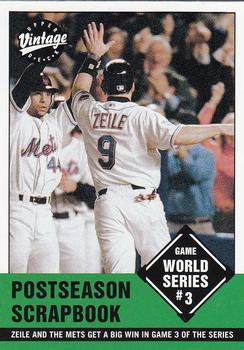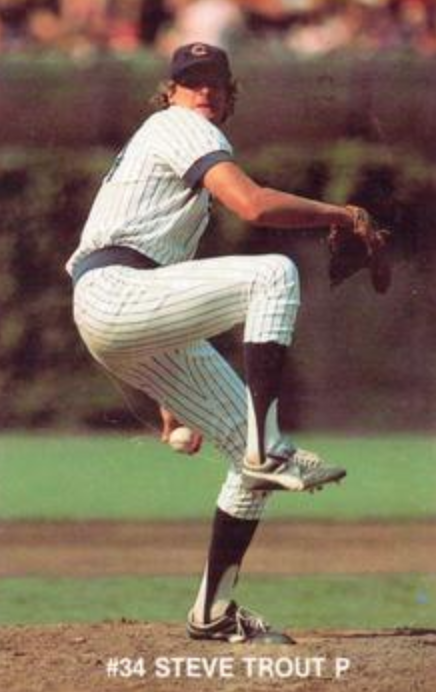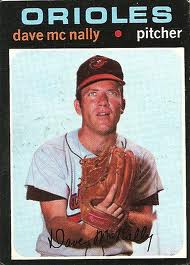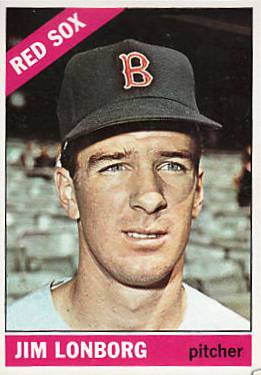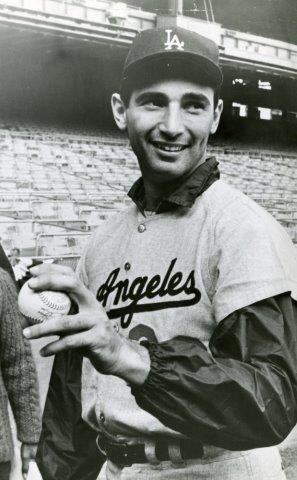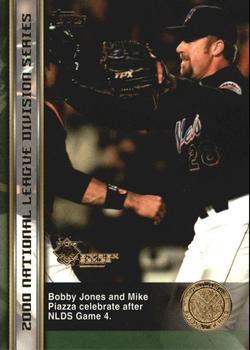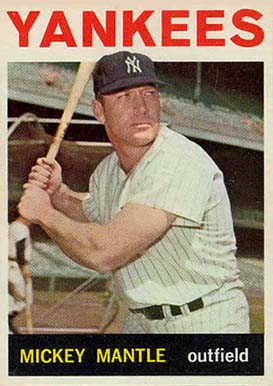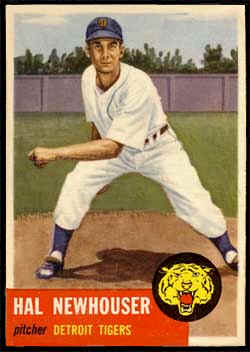October 12, 1988: Hershiser shutout on two days’ rest sends Dodgers to World Series
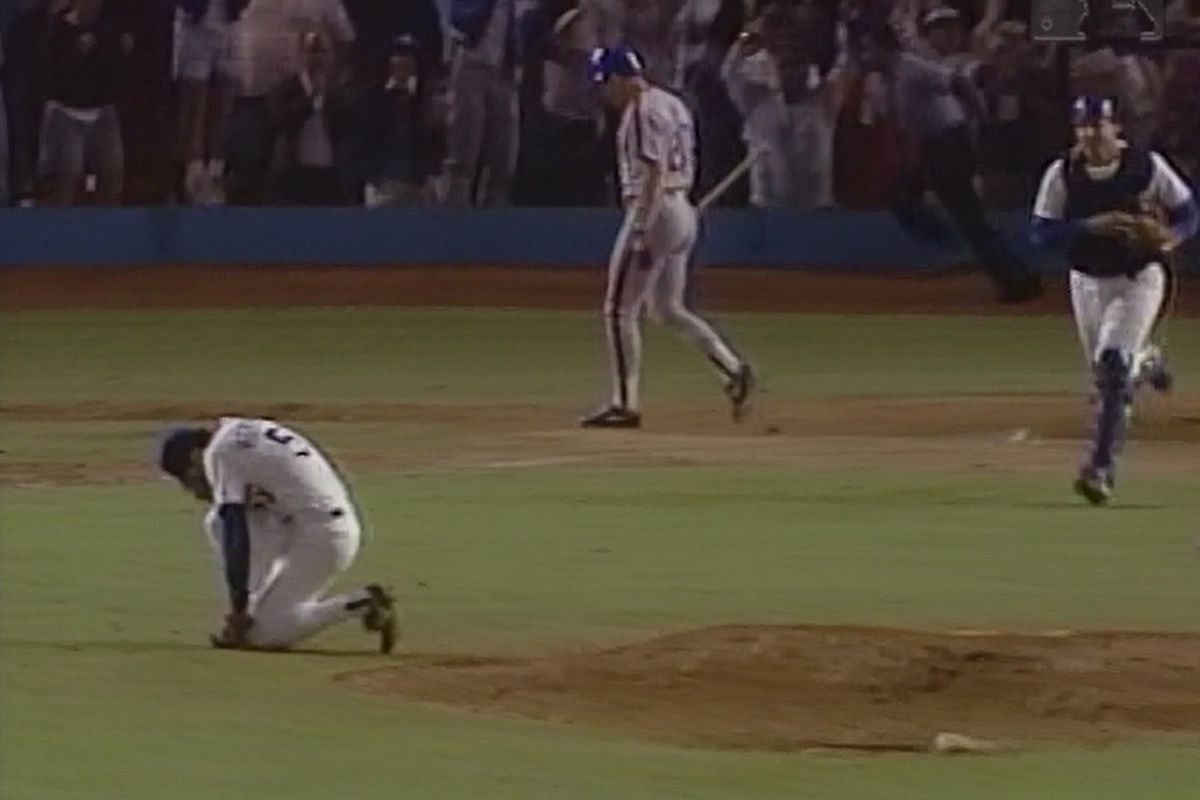
It all came down to this one game. The Dodgers and the Mets had battled through the first six games of the 1988 National League Championship Series. A crowd of 55,693 packed Dodger Stadium to see who would go to the World Series and face the Oakland A’s, who had swept the Boston Red Sox to win the American League pennant.
The Dodgers had lost 10 of 11 games against the Mets during the season. But the Dodgers realized that those games did not matter at this point in the season. They just wanted to return to the World Series for the first time since 1981. The Mets were heavy favorites to go to the Series for the second time in three years. The Dodgers Dodger manager Tommy Lasorda said that his team was one “that everybody thought never belonged there.”1
Mets manager Davey Johnson chose Ron Darling to take the mound for the Mets. Darling had pitched six innings in the third game of the series, giving up three runs in the Mets’ 8-4 win. Darling pitched for the Mets in the seventh game of the 1986 World Series so he was no stranger to difficult situations. Before the game, he said, “That time, I was really excited to pitch. Then we had the rain delay and it took a lot of the emotion out of it for me. But that isn’t going to happen this time. After all, it never rains in Southern California, does it?”2
Darling would face the Dodgers Orel Hershiser, who also started Game Three. Hershiser pitched seven innings and gave up three runs in that game. Hershiser had also started the first game of the series and lost a victory when the bullpen blew a save. He earned a save himself when he closed out the Dodgers’ extra-innings win in Game Four. The only time Hershiser had been in a Game Seven situation was in a national amateur tournament before he turned pro. Like Darling, who pitched only three innings in the 1986 game, Hershiser pitched only a couple of innings in that game.
Before this game, Davey Johnson told the media that he felt confident because Hershiser was pitching on short rest. It was his third start in nine days. Hershiser said later that Johnson’s comments may have misfired. “We got [fired up] because Davey Johnson then joined the media parade as far as ripping on us,” he said.3
After Lenny Dykstra led off and flied out to left field, Wally Backman singled and Keith Hernandez walked. Darryl Strawberry grounded to second and Hernandez was forced at second, leaving runners on first and third. But Kevin McReynolds lined out to third and the Mets lost their opportunity to take the lead.
In the bottom of the inning, the Dodgers wasted no time in scoring off Darling. Steve Sax led off with a single, Billy Hatcher doubled, and Kirk Gibson hit a sacrifice fly that scored Sax. It was redemption for Gibson, who had sabotaged the Dodgers’ chances by popping out on a bunt the night before. The Dodgers led, 1-0. Darling struck out the next two batters. They were his only strikeouts, because he did not last through the second inning.
In the bottom of the second, the Dodgers continued their assault on Darling. Mike Scioscia, Jeff Hamilton, and Alfredo Griffin hit consecutive singles to load the bases. Hershiser then hit a grounder down the third-base line. Greg Jefferies fumbled the ball as he tried to throw home to get the lead runner. Scioscia scored and the bases remained loaded. Sax then hit his second single of the night, scoring Hamilton and Griffin.
Johnson had seen enough. Darling was removed after throwing just 35 pitches. Hoping to stop the bleeding, Johnson called on Dwight Gooden. Gooden had pitched solidly in Games One and Four but did not earn a win in either game. This was the first relief appearance of his career. Johnson reasoned that with “[w]ith Doc pitching, even 4-0, it’s still within our grasp.”4
After Hatcher grounded out, Gibson was walked intentionally to set up a double play. Mike Marshall hit a sharp groundball to the right side. Backman booted it, Hershiser scored, and the bases were still loaded. John Shelby then flied to left field to score the Dodgers’ fifth run. By the time Gooden struck out Hamilton to end the inning, the Dodgers led 6-0.
After giving up a single to Dykstra in the third inning, Hershiser got Backman to fly out to left field and Hernandez to ground into a double play to end the inning. A similar situation happened in the fourth and again Hershiser kept the Mets hitters in check. He seemed to get stronger with each inning.
Gooden settled down and gave up only one hit in the third and fourth innings. Terry Leach took over in the fifth and scattered three hits over two innings. Rick Aguilera pitched the last two innings for the Mets and did not allow a hit.
After giving up a single in each of the first four innings, Hershiser didn’t allow another until Jefferies doubled in the seventh inning. A wild pitch allowed Jefferies to reach third, but Hershiser again shut down the Mets as he got Gary Carter and Kevin Elster to fly out. Jefferies’ double ended up being the last hit for the Mets.
Hershiser was just as amazed at his performance as the fans in Dodger Stadium. “I had no idea I could shut them out on only two days’ rest,” he said. “My mechanics were very bad for about the first two or three innings. Finally I got into a groove and made some adjustments.”5
After the game, Lasorda told reporters: “What a job this guy has done for us. If he’s not the Cy Young Award winner I want the FBI to investigate it.”6 The Dodgers were not expected to win the series but Lasorda was never in doubt, especially of Hershiser’s performance: “We definitely aren’t a dominating team. We sometimes look like a high-school team. But when we fire on all cylinders, we win.”7
“We have no excuse for losing,” Johnson told reporters in the quiet Mets locker room. “We expected to win another world championship, and didn’t. I’ve got a bad taste in my mouth. But I don’t fault the guys for anything.”8
Hershiser was named the most valuable player in the series. He started three games and relieved in one. With the Game Seven shutout, he had pitched seven shutouts in nine starts. During that time, he pitched himself into history by throwing 67 scoreless innings. Lasorda summed up his performance when he said, “[Y]ou have witnessed great pitching. Three times in this series, Orel started. Twice, he went to the bullpen. He’s got great heart.”9
Sources
In addition to the sources cited in the Notes, the author also used the Baseball-Reference.com, and Retrosheet.org websites for boxscore, player, team, and season pages, pitching and batting game logs, and other pertinent material.
https://www.baseball-reference.com/boxes/LAN/LAN198810120.shtml
https://www.retrosheet.org/boxesetc/1988/B10120LAN1988.htm
Photo credit: MLB.com.
Notes
1 Lyle Spencer, “Oral History of Epic Mets-Dodgers 1988 NLCS,” MLB.com, October 5, 2015, found online at mlb.com/news/oral-history-of-epic-mets-dodgers-1988-nlcs/c-152995440.
2 Bill Dwyre, “Dodgers Leave It to the Bulldog,” Los Angeles Times, October 13, 1988.
3 Spencer.
4 Joseph Durso, “Dodgers Win It as Hershiser Shuts Out Mets,” New York Times, October 13, 1988.
5 “Hershiser Hurls Dodgers to 6-0 Flag Clincher,” Los Angeles Times, October 13, 1988.
6 “Hershiser Hurls Dodgers to 6-0 Flag Clincher,”
7 Durso.
8 Durso.
9 Durso.
Additional Stats
Los Angeles Dodgers 6
New York Mets 0
Game 7, NLCS
Dodger Stadium
Los Angeles, CA
Box Score + PBP:
Corrections? Additions?
If you can help us improve this game story, contact us.


